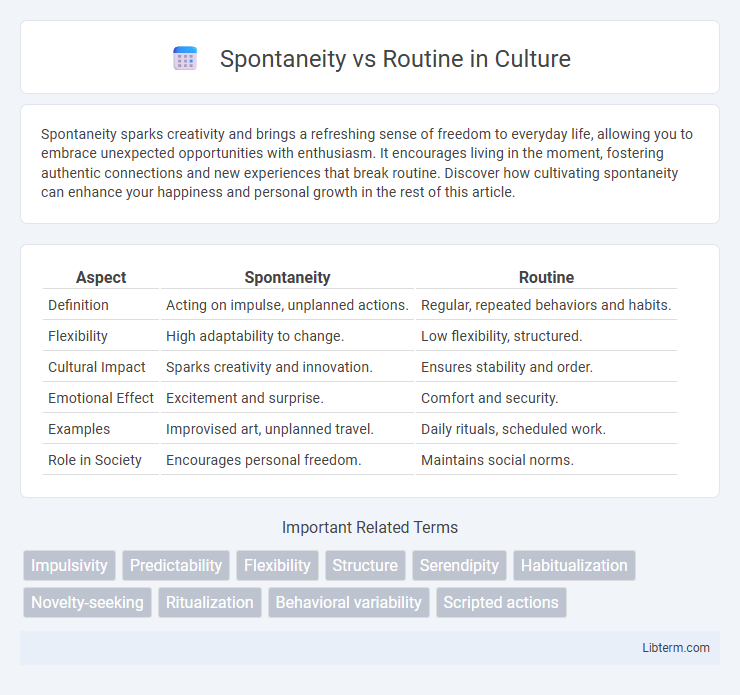Spontaneity sparks creativity and brings a refreshing sense of freedom to everyday life, allowing you to embrace unexpected opportunities with enthusiasm. It encourages living in the moment, fostering authentic connections and new experiences that break routine. Discover how cultivating spontaneity can enhance your happiness and personal growth in the rest of this article.
Table of Comparison
| Aspect | Spontaneity | Routine |
|---|---|---|
| Definition | Acting on impulse, unplanned actions. | Regular, repeated behaviors and habits. |
| Flexibility | High adaptability to change. | Low flexibility, structured. |
| Cultural Impact | Sparks creativity and innovation. | Ensures stability and order. |
| Emotional Effect | Excitement and surprise. | Comfort and security. |
| Examples | Improvised art, unplanned travel. | Daily rituals, scheduled work. |
| Role in Society | Encourages personal freedom. | Maintains social norms. |
Understanding Spontaneity and Routine
Spontaneity involves embracing unplanned actions driven by impulse or creativity, often leading to novel experiences and flexible problem-solving. Routine consists of structured, repeated behaviors that create stability, efficiency, and predictability in daily life. Understanding the dynamic between spontaneity and routine helps balance adaptability with consistency, enhancing overall well-being and productivity.
The Psychology Behind Spontaneous Actions
Spontaneous actions trigger the brain's reward system by releasing dopamine, fostering feelings of excitement and pleasure. Routine behaviors engage the prefrontal cortex, promoting stability, predictability, and reduced cognitive load. Balancing spontaneity and routine supports mental well-being by combining novelty-seeking with structured habits.
Benefits of Embracing Routine
Embracing routine enhances productivity by creating consistent habits that reduce decision fatigue and increase focus on important tasks. Routine supports mental well-being through predictable structures that lower stress and promote better sleep patterns. Regular schedules facilitate goal achievement by establishing clear priorities and reinforcing disciplined time management.
Drawbacks of Over-Relying on Structure
Over-relying on routine can stifle creativity and limit adaptability by creating a rigid environment where spontaneity is discouraged. Excessive structure often leads to decreased motivation and increased stress due to the lack of flexibility in responding to unforeseen opportunities or challenges. This rigidity can hinder innovation and reduce the ability to think outside the box, negatively impacting personal growth and problem-solving skills.
Spontaneity: Fuel for Creativity and Innovation
Spontaneity acts as a catalyst for creativity and innovation by encouraging unplanned ideas and fresh perspectives that routine often stifles. It promotes flexible thinking and adaptive problem-solving, essential for breakthrough developments in various fields. Embracing spontaneity fosters an environment where original concepts can flourish, driving continuous improvement and novel solutions.
Routine: Building Consistency and Discipline
Routine establishes consistency by creating structured habits that enhance productivity and reduce decision fatigue. Discipline cultivated through regular routines strengthens self-control, promoting long-term goal achievement and mental resilience. Maintaining a steady routine optimizes time management, ensuring steady progress and minimizing stress in daily activities.
How to Balance Spontaneity and Routine
Balancing spontaneity and routine requires setting flexible schedules that allow space for unexpected activities while maintaining essential daily habits. Prioritizing key tasks ensures productivity, while deliberately incorporating spontaneous moments fosters creativity and reduces stress. Using tools like planners with open slots helps maintain this equilibrium, promoting both structure and freedom.
Personal Growth Through Flexible Living
Embracing spontaneity over rigid routine fosters personal growth by encouraging adaptability and creative problem-solving. Flexible living cultivates resilience, allowing individuals to navigate unexpected challenges while discovering new perspectives. This dynamic approach enhances self-awareness and promotes continuous learning beyond conventional structures.
Spontaneity vs Routine in Relationships
Spontaneity in relationships fosters excitement and deepens emotional bonds by encouraging surprise gestures and unplanned activities that break monotony. Routine provides stability and predictability, creating a secure environment where partners understand each other's habits and expectations. Balancing spontaneity with routine enhances relationship satisfaction by combining the thrill of novelty with the comfort of consistency.
Finding Your Optimal Lifestyle Balance
Balancing spontaneity and routine involves identifying the ideal mix that supports productivity and well-being without compromising creativity or stability. Establishing flexible routines that allow room for unplanned experiences helps optimize mental health and adaptability. Research from behavioral psychology suggests that integrating both structured habits and spontaneous activities enhances overall life satisfaction and reduces stress.
Spontaneity Infographic

 libterm.com
libterm.com